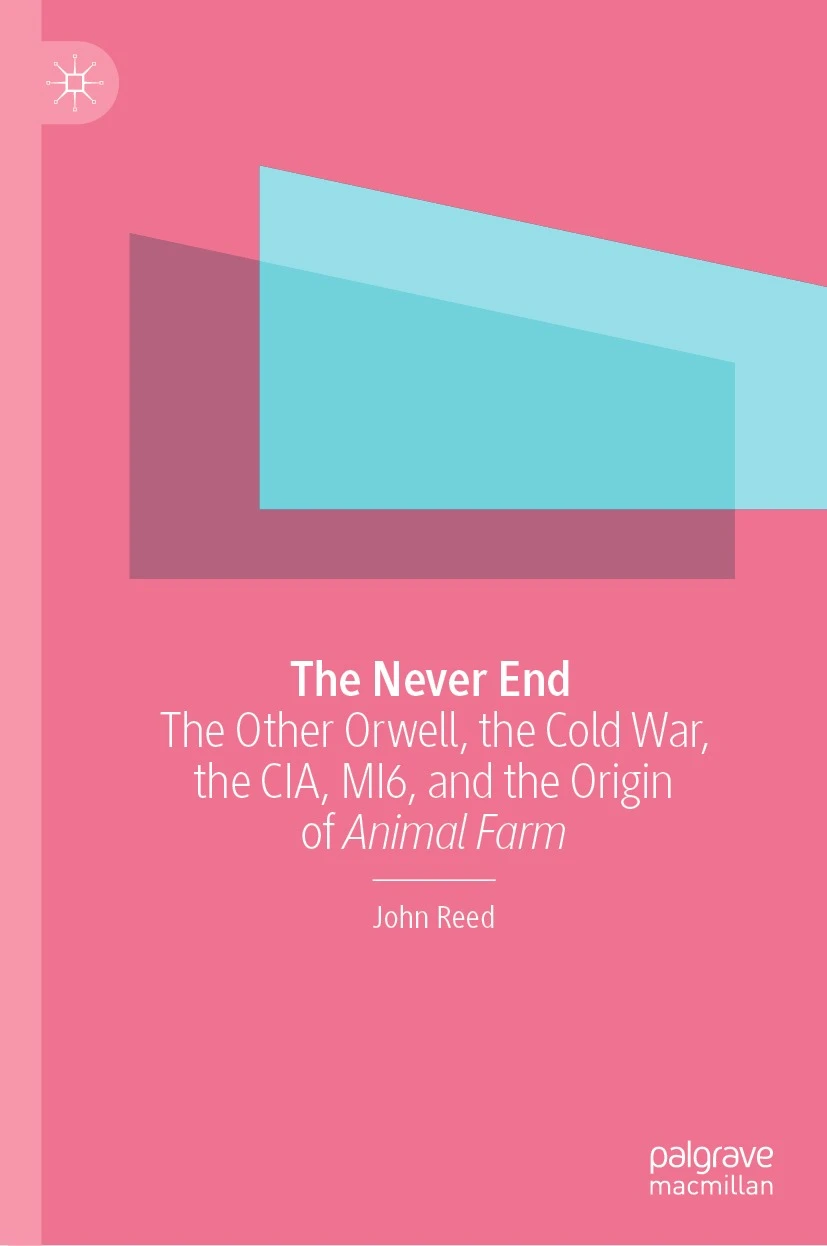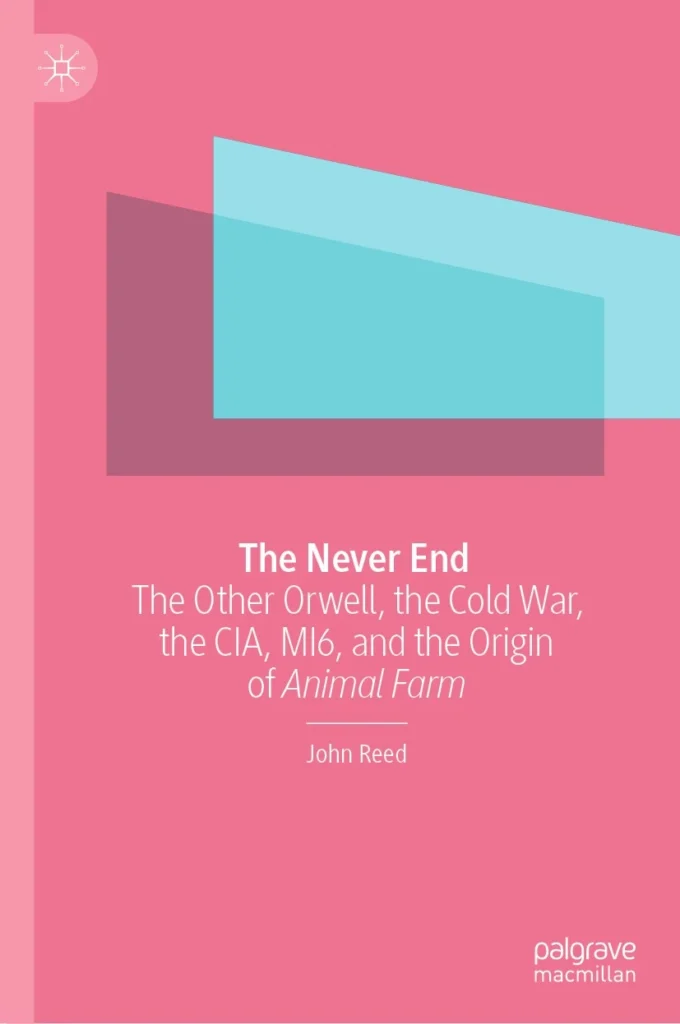
The Never End: The Other Orwell, the Cold War, the CIA, and the Origin of Animal Farm (Palgrave Macmillan)
Has George Orwell lost his saintly luster? In The Never End, rabble-rouser, dogged investigator, and consummate literary stylist John Reed collects two decades of subject-Orwell findings previously published in PANK, Guernica, Literary Hub, The Brooklyn Rail, The Rumpus, The New York Press, The Believer, Harper’s Magazine, and The Paris Review. Reed’s treatment of Orwell is corrective and peerlessly contemporary; he views Orwell in a twenty-first century global context, considering Orwell’s collaboration with Cold War intelligence operations—US and UK—with unfaltering objectivity. It’s hard to imagine that Orwell—in our own moment of global doublethink—wouldn’t have wanted his devotion to contrariety applied to the literary legacy he left behind. The Never End is at once a hatchet job and a celebration. Animal Farm, based on a previously unknown Russian short story? Animal Farm, deployed by the CIA, MI6 and the Congress for Cultural Freedom? Orwell, turning over blacklists in a McCarthy-esque act of betrayal? The Cold War? Does it last forever? Russia, the “Axis of Evil,” and now China? But. Orwell. Course syllabi. Literary laurels. Snitch. Why do we keep coming back? For the wrong reasons? Or because we know Old Benjamin would want us to know the truth?

Published by PALGRAVE MACMILLAN
- Order here!
- Ben Tripp at Tupelo Quarterly on The Never End
- This Podcast Will Change Your Life is a special | AWP 2024 with John Reed
- JR with Tiffany Troy | The Brooklyn Rail
- Aline Soules on The Never End | Compulsive Reader
- JR with Andrea Scrima | 3Quarks
- Zoe Berkovitz on The Never End | Rain Taxi
- Diane Donovan on The Never End | Midwest Book Review
- The Feeling and Fear of Inevitability | The Brooklyn Rail
- Jordan A. Rothacker in conversation with John Reed | Literary Hub
- The Rumpus: Brett Rawson in conversation with John Reed
- JR Live at the ICI with the Reanimation Library
- JR on “Snowball’s Chance” Ten Years Pt 1 | PopMatters
- JR on American Grandeur Pt 2 | PopMatters
- JR on Regrets and Snowball | WSJ
- Snowball’s Chance, Ten Years Later | Guernica
- Fiction Addiction at 2A | Electric Literature
- JR’s Fifty Books that Brainwashed Me | Big Other
- JR: Take the Shelf | Bomb Magazine
Reed makes and impeccable case. … The Never End is essential. —Zoe Berkovitz, Rain Taxi
Readers fascinated with George Orwell’s Animal Farm will want to make The Never End: The Other Orwell, the Cold War, the CIA, MI6, and the Origin of Animal Farm a “must read.” … Reed raises some intriguing questions. These strike at the heart of not just literary tradition and a revered figure of revolution, but the process by which literature connects to political institutions and special interests who would deploy it as yet another opportunity for social influence and change. Surveying issues of “selling out” and supporting a system or sparking the kinds of change that lead to shifts in social and political reality, Reed offers a wide-ranging discussion that delves into history and social order as deeply as it draws together links between disparate lines of thought and different disciplines. —Diane Donovan, Midwest Book Review
In the aftermath of September 11, 2001, ideas that had been germinating suddenly coalesced, and in three weeks’ time Reed penned a parody of George Orwell’s Animal Farm. The memorable pig Snowball would return from exile, bringing capitalism with him—thus updating the Cold War allegory by fifty-some years and pulling the rug out from underneath it. … Orwell’s writing had long been used as a propaganda tool, and evidence had emerged that his political leanings went far beyond defaming communism—but if facing this basic historical truth was so unthinkable, what was the taboo preventing us from seeing? Reed’s examination of our Orwell preoccupation sifts through the changes the West has undergone since the Cold War: its cultural crises, its military disasters, its self-deceptions and confusions, and more recently—perhaps even more troubling—its new instability of identity. —Andrea Scrima, 3Quarks
Reed has captured the state of the farm today. —The Fort Myers News-Press
A dizzying feat of writing and scholarship. —Lynne Tillman
One plays this terrifying guessing game of animal a clef: which animal am I? Which animal is my neighbor? —Jonathan Ames
A pig returns to the farm, thumbing his snout at Orwell … the world had a new evil to deal with, and it was not communism. —The New York Times
Snowball, now a capitalist pig, returns to the farm and transforms it into Animal Fair, a garish, polluting theme park, financed by a company called Henron. —Money Magazine
One of the keenest thinkers of our time. —PopMatters